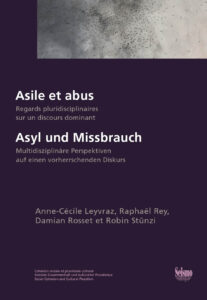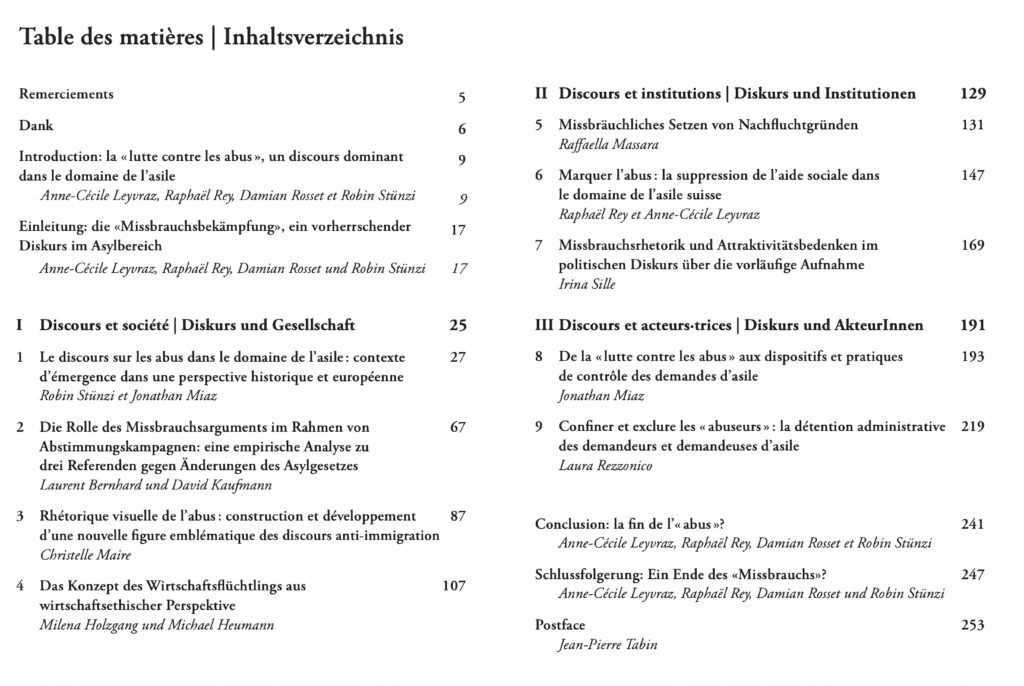“Abuse” : a structuring and performative notion in the field of asylum

The notion of abuse is omnipresent in the public debate on asylum. This discursive device has emerged as the inseparable counterpart of asylum both in social and political discourse as well as in the practices of actors implementing asylum law. It is a lens through which the problems and solutions related to the field of asylum are contemplated. But what are the forms and expressions of abuse in the Swiss asylum context? We explore some elements of response based on the findings of our edited book published today: “Abus et asile / Asyl und Missbrauch” (Leyvraz, Rey, Rosset and Stünzi, 2020).
Among the many discourses that have accompanied the politicization and polarization of asylum in Switzerland since the 1980s, the rhetoric of the “fight against” has been the most prominent. Alongside the stated objectives of speeding up asylum procedures and reducing the attractiveness of the country, “the fight against abuses of the asylum system” has become a mantra, a preamble to every political declaration on the subject of asylum and refugees.
Borrowing from older discursive patterns and representations of immigration in Switzerland (Maire, 2020), the rhetoric of abuse in the field of asylum can be traced back to the 1950s. Yet, its solidification in official and political discourse occurred during the second revision of the Asylum Act (1983), in a context characterized by increasing (and undesired) asylum applications and diversification of the countries of origin of the applicants.
The multiple meanings of abuse
The primary meaning of the notion of abuse emerged during the early 1980s. Based on the distinctions between “real” and “bogus” refugees, it refers to asylum claims that are considered ill-founded. The dichotomy between real/fake, good/bad, genuine/abusive triggers an emotional – but also a moral and a political response. Indeed, it suggests that the integrity of the asylum system is threatened, financial resources misused and control over immigration lost (Stünzi and Miaz, 2020).
In the 1980s, “abuse” came to also encompass the idea that asylum-seekers purposefully engaged in misleading behavior to slow down the procedure. Destruction of identity documents, concealment of identity, multiple applications, and lack of cooperation aiming at extraordinary legal procedures. Such a portrayal of abuse implies that asylum-seekers are taking advantage of a naïve and overly lenient system.
Later, in the early 1990s, the concept went on to cover an additional meaning, that of petty crime linked to drug trafficking. It was given considerable credit for the controversies related to the open drug scenes in Zurich. The notion continued to be used in the 2000s, largely at the instigation of the Swiss People’s Party (SVP), whose electoral progress benefited from the framing of the issue of asylum in terms of “abuse” and depicting (failed) asylum seekers as “bogus criminal refugees.”
Mobilizing “abuse”
The notion of abuse has been regularly mobilized by political forces to gain the necessary support to pass restrictive bills. Its impact on past and present legislation is for example evident in the Swiss Parliament on the cutting of social benefits for failed asylum seekers (Rey and Leyvraz, 2020) or for persons who have been granted temporary admission (Sille, 2020). As the meaning of “abuse” gradually came to encompass a broader variety of behaviors and situations, restrictive measures increased to such extent as to undermine fundamental rights and to question certain foundations of the rule of law. The right to an effective remedy, access to asylum procedures and personal liberty are just but a few examples. The difficulty of enforcing removal decisions and the delinquency of certain asylum seekers has legitimized long periods of detention.
This being said, the stated objectives of the restrictions – to enforce removals and reduce attractiveness – tend to hide the expected, domestic, political gain the discourse on abuses can help achieve. Regardless of the effectiveness and human consequences of increasing restrictions, advocating for restrictive asylum policies is directed at the electorate, as a discursive commitment to the defense of national sovereignty.
Abuse in everyday practices
The “fight against abuse” has not only conditioned the political debates and the frenetic development of the asylum legislation, but also affects the everyday practices related to the implementation of laws and regulations (Massara, 2020). Fear and suspicion drive the actions and decisions of judicial and administrative agents on refugee status determination (Miaz, 2020) and administrative detention (Rezzonico, 2020). These agents not only mobilize the notion of asylum, but also the social construct associated with it to perform their work. The perception that (failed) asylum seekers are bogus claimants abusing the system saturates the implementation of asylum law.
The consequences of the rhetoric of the “fight against abuse” on the Swiss asylum system are considerable; it is the lens through which the question of asylum is framed, understood, debated and acted upon. The contributions to the edited volume “Asile et abus / Asyl und Missbrauch” (Leyvraz, Rey, Rosset and Stünzi, 2020) all shed light on particular aspects of this dominant discourse. The book shows the structuring power of the notion of abuse in societal debates, institutional processes and bureaucratic practices in the field of asylum in Switzerland.
Anne-Cécile Leyvraz is a research fellow at the University of Applied Sciences and Arts Western Switzerland (HETSL | HES-SO). Raphaël Rey is a doctoral student in Social Sciences at the University of Neuchâtel. Damian Rosset is a Postdoctoral researcher at the University of Neuchâtel. Robin Stunzi is a Scientific Officer of the NCCR.
Reference:
– Leyvraz, Anne-Cécile, Raphaël Rey, Damian Rosset et Robin Stünzi (dir.) (2020). Asile et Abus – Regards pluridisciplinaires sur un discours dominant / Asyl und Missbrauch – Multidisziplinäre Perspektiven auf einen vorherrschenden Diskurs, Zurich: Seismo. (Available in print and in open access)




